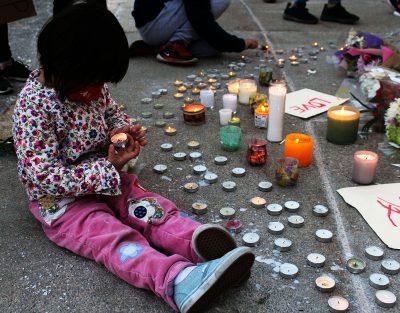Xiaojie Tan, Soon Chung Park, Hyun Jung Grant, Suncha Kim, Yong Ae Yue, Daoyou Feng, Paul Andre Michels and Delaina Yaun. These are the names of the eight victims of the Atlanta shooting Tuesday night.

Michele Luo stood on the steps of Newton City Hall, facing a crowd of nearly 1,000, as she read these names as part of her opening for the Newton Asian Community Vigil Sunday evening.
Luo is the co-president of the Chinese American Association of Newton, one of the local Chinese cultural groups that co-hosted the event along with the Newton Chinese Language School and The Greater Boston Chinese Cultural Association.
“The community spoke,” Luo said in an interview. “Everybody felt the pain, so it’s not just the pain [from] the Asian American community, it’s the pain [from] the whole Newton and broader community.”
Authorities investigating the case have yet to determine a motive for the killings. However, the group of victims — six Asian women out of the eight killed — has led to waves of outrage from the Asian community.
Li Zhen, a CAAN representative, was one of the speakers at the vigil. She described her experience as an Asian American woman, naming instances she has been told to “keep your head down.”
“This Asian American woman is fed up,” she said. “This mother of two Asian American girls is angry today and cannot be shut down anymore, from now on.”
Zhen also shared a time where she witnessed two young children of color automatically get assigned to roles in a school musical based on their skin color, getting cast as “slave girl, slave boy.”
“You might think that’s a very small discrimination, but for six, seven-year-olds, that hurts,” Zhen said. “That will have a seat in their heart.”
Luo and Zhen were not the only Asian American women who spoke out. Boston University School of Social Work professor Hyeouk Chris Hahm also delivered an address, in which she pointed to the realities of life in the United States and how the nation does not currently reflect its Chinese name, which directly translates to “beautiful country.”
“This beautiful country has again revealed the ugly and despicable side of its face,” Hahm said. “Its name is racism.”
The vigil saw an array of community leaders and representatives, including Newton Mayor Ruthanne Fuller and Middlesex District Attorney Marian Ryan.
Fuller highlighted the efforts of the Asian American community, who provided protective equipment to hospitals, nursing homes and first responders during the pandemic, among other donations.
“Our Asian friends and neighbors and Newtonians responded to acts of hate with deeds of love,” Fuller said. “Our community is built on the unifying values of respect, acceptance and diversity. And here in Newton, an act of racism toward one is an act of hate toward us all.”
The coronavirus fueled a national increase in anti-Asian hate crimes by almost 150% in the last year, and New York City alone saw a 833% leap, according to a recent study conducted by the Center for the Study of Hate and Extremism at California State University, San Bernardino.
Rep. Jake Auchincloss, D-Mass., who serves Massachusetts’ fourth district, also made an appearance. In his speech, he brought up the lack of gun regulation in the country, questioning the Atlanta suspect’s accessibility to a firearm.
“Why is it that you can buy and use a gun the same day in Georgia,” Auchincloss said, “but you can’t register and vote the same day in Georgia?”
Auchincloss announced that he has co-sponsored a bill investigating COVID-19-related hate crimes, H.R.1843, because “we understand that we have a problem as a country.”
Helen Li, of South Shore, came to Newton to attend the event. Li, a former Newton public school educator, used to live in Newton with her family. She characterized the Atlanta shooting as a “tipping point” for the Asian community.
Drawing on the Chinese maxim “eat the bitterness,” Li said she witnessed first-hand how both her half-Chinese daughters were bullied in school.
“The parents and the grandparents who don’t speak any English, they will really just be silenced,” Li said. “They have no choice.”
The root of the issue is a lack of awareness from the greater environment, Li said, and parents are afraid to speak up out of a fear of jeopardizing their children’s education.
“There’s a lot of microaggressions,” Li said. “There’s a lot of assumptions made without communicating.”
CAAN co-president Luo said she thinks a potential solution to these racist remarks is introducing Asian history to students at a younger age.
“Students should not wait until college to learn about Asian Pacific Islander history,” Luo said. “This should be part of American history.”
For Terry Altherr, a Tokyo-born Newtonian, something as “tragic and horrific” as the Atlanta shooting is a chance for national reckoning and reconciliation.
“Many parts of America don’t agree with each other and we can have our own differences,” Altherr said. “We can bring together and truly stand up to acts of hatred and violence and try to bring back the country from the depths of hell.”

















































































































